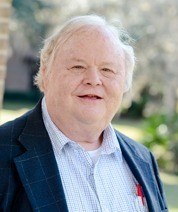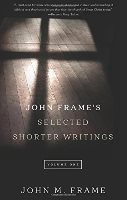John Frame has been teaching and writing theology now for decades, and his impact has been felt by all of us who “do theology” after him. His Apologetics to the Glory of God has been a widely favorite introduction to apologetics, and his Theology of Lordship series – The Doctrine of the Knowledge of God, The Doctrine of God, The Doctrine of the Word of God, and The Doctrine of the Christian Life – are standard-setting works that enjoy high acclaim also. And of course the list could go on.
Especially because I (FGZ) have appreciated and benefitted so much from his work I was eager to read his newest title, Selected Shorter Writings in which he addresses some 38 topics, distributed under four headings: Theology and Theological Method, Theological Topics, Apologetics, Ethics & Worship, and Personal. The “Personal” dimension was a nice touch, allowing us who have only read Frame from a distance to get to know him a bit better. We are pleased to have him with us again, this time to talk to us about some select topics in his new book.
Books At a Glance (Fred Zaspel):
You came to Christ at the age of 13, and I understand that one of your first positions of service in the church was treasurer for the youth group. And I understand that you were rather effective in collecting funds – is that right?
Frame:
I don’t remember being particularly effective in the job, but I was pretty boisterous. I harangued my fellow youth to bring quarters for the offering every week and scolded those who didn’t. A lot of law, little grace. I probably discouraged a lot of potential givers, maybe more than I encouraged.
 Books At a Glance:
Books At a Glance:
Your time as a student at Princeton University was a significant moment in your spiritual development. Would you tell us about that?
Frame:
It was my introduction to Philosophy, and that was a great experience. But my teachers were largely unbelieving, and that forced me to seek help in wrestling through theological issues. So I read C. S. Lewis and Cornelius Van Til for the first time, and I found fellowship with some wonderful Christian friends at the Princeton Evangelical Fellowship and the Westerly Road Church.
Books At a Glance:
Tell us why you don’t mind calling yourself a Bible Thumper – what is the point you are trying to make?
Frame:
In the final analysis, God’s word is what I care about. I know that to be a professional theologian you have to study academically responsible subjects: historical theology, contemporary theology, philosophers and scientists. I have done enough of this, I think, to qualify as a professional. But I tend to be bored with academically respectable studies, and I keep wanting to get back to the Scriptures. The real work of the theologian is to apply the Scriptures to the lives of God’s people.
Books At a Glance:
Would you name the top three or four writers / theologians who have most influenced your own thinking?
Frame:
In addition to the Bible, I assume. Cornelius Van Til, John Murray, John Calvin, Vern Poythress.
Books At a Glance:
One of the marks of your work is “perspectivalism.” I suspect that there are many who have read your work would enjoy hearing from you an explanation of this approach. Is there a brief way you can tell us what this is all about?
Frame:
The best introduction is my “Primer on Perspectivalism” in Selected Shorter Writings 1. Even more briefly: there are two kinds of perspectivalism: (1) General: an understanding that we are finite creatures and (unlike God) can see the world only from one perspective at a time. (2) Special: the doctrine that God often reveals himself in threes: the persons of the Trinity, the attributes of Lordship (control, authority, presence), the aspects of the covenant (history, law, sanctions), etc.
Books At a Glance:
What is “intellectual repentance,” and why is it necessary? And what is intellectual discipleship?
Frame:
When we become Christians, we embrace him as Lord – Lord of every aspect of our lives. That seems natural in areas of worship and ethics. What I think needs stressing more often is that Christ is Lord of the intellect as well, and therefore he calls us to repent of our intellectual rebellion (the suppressing of truth in Rom. 1). The positive counterpart of this repentance is intellectual discipleship: seeking his wisdom in all our intellectual endeavors. That means, among other things, doing all our thinking under the authority of God Word.
Books At a Glance:
Questions of patterns and practices of corporate worship have of course spawned endless debates, and on the Reformed side is the Regulative Principle to guide – only elements of corporate worship that are specifically prescribed in the New Testament are allowed. Yet even among the Reformed some debate continues regarding certain practices and styles of worship. Would you share with us your thoughts regarding the Regulative principle and what you call “levels of specificity”?
Frame:
The Regulative Principle says that everything we do in worship must have biblical warrant. But how specific must that warrant be? Do we need a biblical text commanding us to ask people to turn to Hymn 253? Surely not. The “biblical warrants” are usually fairly general, and we make them specific by applying them to our current circumstances, using the wisdom God has given us.
Reformed writers have always recognized this, so they have distinguished the “elements” of worship, which require warrant in the form of a specific command, from “circumstances,” “modes,” and “expressions” in which we seek to apply the general principles of worship to specific questions: what song shall we sing at this point in the service? What is the best way to preach this text? Should we stand or sit during this part of the service? My point is that a lot of the battles we have about the Regulative Principle are really battles about how specific the regulative commands must be.
 Books At a Glance:
Books At a Glance:
The church’s involvement in cultural transformation, social justice, and mercy ministries are common topics of conversation today. What do you think is the church’s role in these? And might it differ from the role of the individual Christian at all?
Frame:
The church is the headquarters on earth of the kingdom of God. So it should train, equip, and empower Christians to lead others to Christ and to maximize justice and mercy in society.
Books At a Glance:
In one of your essays you explain why you vote conservative. Can you summarize your thinking in this regard?
Frame:
Conservatives have a greater respect for religious liberty and for the influence of the church in society. They tend to oppose abortion, for example, while liberals almost always support it. They are less fixated on making each group equal to the others, more focused on protecting the country from external and internal violence, which I take to be the biblical roles of government.
Books At a Glance:
“Economic equality” and “spreading the wealth” are prominent clichés in today’s political arena. In broad terms, at least, what do you think the Bible has to say to this?
Frame:
Scripture tells us to care for the poor. If Christians followed that command, rich and poor would be MORE equal, though nor perfectly equal. It is best that we care for the poor at the most intimate level possible: nuclear family, extended family, church, and then, as a last resort, the state. Scripture does not give a mandate to the state to control the economy of a nation, and when the state tries to do this it usually makes things worse.
Books At a Glance:
When can we expect a volume 2 of your Selected Shorter Writings? And do you have any other new books in the works that we can look for?
Frame:
I expect SSW2 will be released in 2015. That will be a big year. P&R also intends to release then the new edition of Apologetics to the Glory of God, and a big new book on History of Western Philosophy and Theology. For the long term, I’m writing a book of apologetics for non-Christian readers, a Memoir, a book of Letters, and possibly an SSW3.

